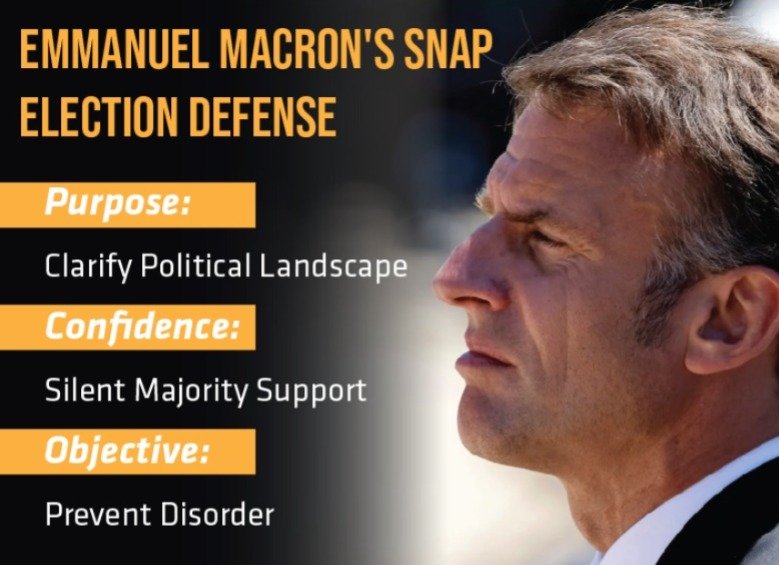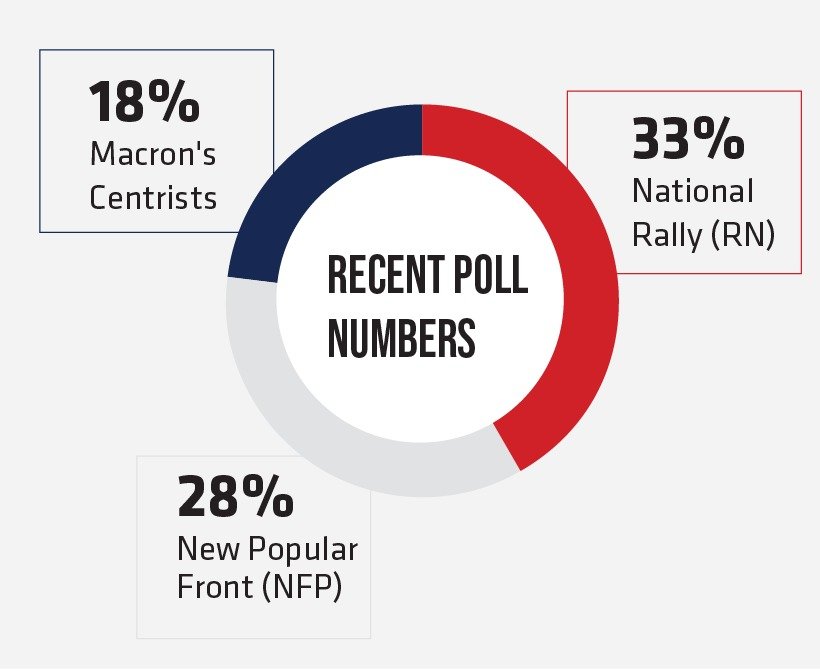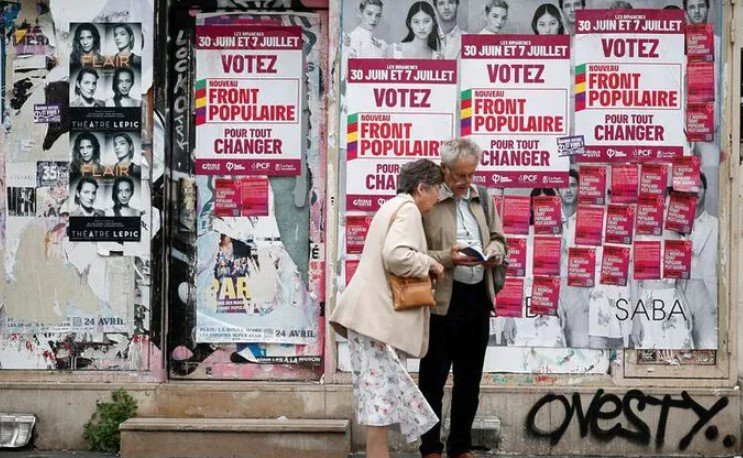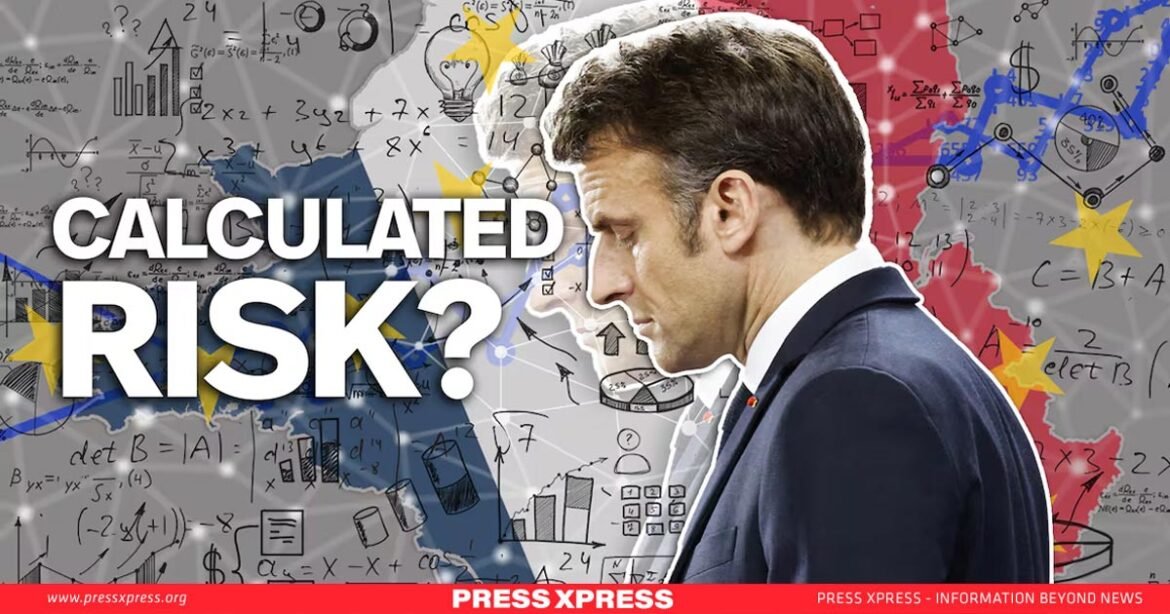- Macron’s snap election call is seen as risky and potentially disastrous.
- His attempt to weaken rivals has instead strengthened their alliance
- Despite Macron’s confidence, polls suggest uncertain outcomes
Macron’s High-Stakes Gamble: Snap Elections in France
President Emmanuel Macron’s call for snap legislative elections in France has been met with widespread criticism and skepticism. Following a significant defeat to the far-right National Rally (RN) in the European elections, Macron’s decision to dissolve parliament is being viewed as a risky and potentially disastrous move.
You can also read: Britain in ‘Purdah’ as elections approach
Vincent Martigny, a political science professor at Nice University, described it as “one of the most absurd and unconsidered decisions in the history of the (post-war) Fifth Republic.” Some analysts are even drawing parallels to David Cameron’s ill-fated Brexit referendum in 2016.
Emmanuel Macron
Emmanuel Macron’s party, which was renamed La Ré- publique En Marche (LREM) after the 2017 French parliamentary election, won a majority in the National Assembly the following month. In the 2022 presidential election, Macron defeated Le Pen for a second term, becoming the first French presidential candidate to win reelection since 2002.
During his presidency, Macron has overseen several re- forms to labor laws, taxation and pensions, and pursued a renewable energy transition. In 2018 yellow vest pro- tests and other rallies culminated in opposition to his domestic measures, notably a proposed gasoline tax. He has been in charge of France’s continuing COVID-19 pandemic response and vaccine deployment since 2020. In international policy, he lobbied for European Union changes and negotiated bilateral treaties with Italy and Germany.

Macron’s Risky Bet: Shock Elections Divide France
President Emmanuel Macron’s sudden decision to dissolve parliament and call for snap elections has sent shockwaves through French politics, including within his own camp. The move, made with minimal consultation and catching even Prime Minister Gabriel Attal off guard, has drawn sharp criticism from former allies.
Gilles Le Gendre, once head of Macron’s parliamentary party, lambasted the decision as “senseless,” “risky, needless and dangerous” in an interview with Le Monde. This internal dissent underscores the controversial nature of Macron’s gambit.
Defending his choice, Macron argues the election is necessary to “clarify” the political landscape. He remains confident that a “silent majority” will support his candidates to prevent “disorder.” However, recent polls paint a challenging picture for the president’s party:

The Elysée’s strategy hinges on France’s two-round voting system. They hope voters will rally against extremes in the July 7 run-offs, following the initial June 30 vote. While an RN absolute majority isn’t ruled out, a hung parliament is another possibility – a scenario that could potentially benefit Macron.
This high-stakes move comes as Macron has struggled to implement his agenda since losing his parliamentary majority in June 2022. As France braces for a fierce campaign, the political landscape remains highly uncertain, with Macron betting on his ability to navigate the complex electoral dynamics and emerge stronger despite the current polls.
Macron’s Miscalculation: Did Snap Election Gambit Backfire?
President Emmanuel Macron, often praised for his political timing, may have overplayed his hand with the call for snap elections. His strategy, aimed at exploiting divisions within the left, appears to have backfired spectacularly.
Macron had hoped that ongoing rifts among left-wing parties, particularly over the Gaza conflict, would prevent them from uniting before the parliamentary election. This, he calculated, would position his centrists as the primary defense against the far-right.
However, as Le Monde aptly put it on June 14, the president “fell into a trap of his own making.” Contrary to Macron’s expectations, the centre-left swiftly joined forces with the hard-left France Unbowed to form the New Popular Front (NFP). Polls now suggest this alliance represents the strongest bulwark against the far-right, undermining Macron’s strategic positioning.
In response, Macron has reverted to his 2017 campaign tactics, portraying both the hard left and far right as equally extreme and warning of economic turmoil should his party lose. However, this approach may not be as effective in the current political climate.

Political analyst Chloe Morin highlights a potential flaw in Macron’s strategy. The two-round voting system, typically seen as an advantage for centrist candidates, could backfire if Macron fails to mobilize moderate voters in the first round. Morin warns that this scenario could force voters to choose between the left and the far-right National Rally (RN) in the second round, potentially giving the RN a shot at an absolute majority.
As the campaign unfolds, it’s becoming clear that Macron’s attempt to outmaneuver his opponents has instead reshaped the political landscape in ways he didn’t anticipate, potentially jeopardizing his own position and that of his party.
Macron’s Party in Crisis
President Emmanuel Macron‘s Renaissance party finds itself in dire straits as the snap election campaign unfolds. With Macron’s popularity at a low ebb, Prime Minister Gabriel Attal has taken the lead in campaigning efforts, while Renaissance candidates noticeably omit the President’s image from their campaign materials.
The situation appears grim, with one Renaissance campaign official confiding to AFP, “We need nothing short of a miracle to win.” This sentiment reflects the growing pessimism within Macron’s camp as they face an uphill battle against a united left and a surging far-right.
Le Monde reports rising tensions in the Elysée Palace, with Macron reportedly frustrated by what he perceives as a “spirit of defeat” among some staff members. The President’s attempts to rally his team seem to be falling short as the reality of their political predicament sets in.
Political scientist Vincent Martigny offers a stark assessment, stating he sees “no chance at all for Macron to win.” While Macron has ruled out resigning regardless of the outcome, Martigny suggests that if the far-right National Rally (RN) emerges as the clear winner, resignation “might be his only honourable option.”
Conclusion
As the campaign progresses, Macron’s party faces the daunting task of reversing their fortunes against seemingly insurmountable odds. The coming weeks will determine whether they can achieve the “miracle” they so desperately need or if France is headed for a seismic shift in its political landscape.


